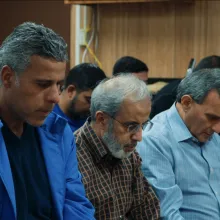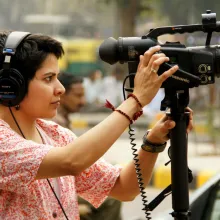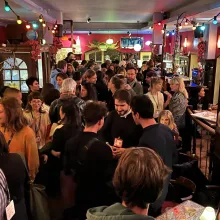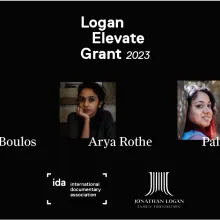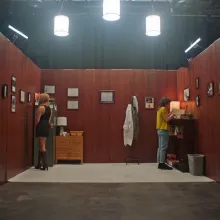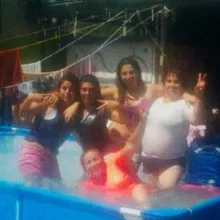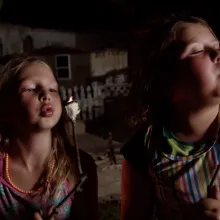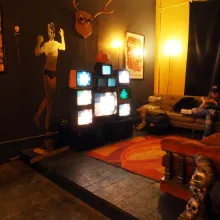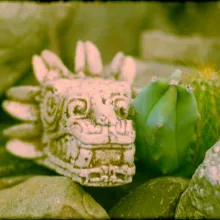Kokomo City opens with a bang. Liyah is lying on her bed, a giant stuffed teddy bear in the background, as she recounts a past meeting with a man. Just as things were getting sensual, she noticed a gun next to him. “This was one of the most scariest moments of my life doing sex work…it’s either his life, or mine,” she says. As she narrates her shock and the ensuing tussle, playful, bombastic music intersperses with her speech. This scenario ended amicably, but Liyah reminds the audience that’s not always the case. “In this game, either you get out of it, or you end up dead, you end up popped
Latest Posts
Documentary is happy to debut an exclusive clip from Li Lu’s documentary series A Town Called Victoria , which will debut on Independent Lens as a co-presentation with Reel South on November 13 and 14, with streaming on PBS’s Youtube channel to follow. This observational documentary series follows the fallout from an act of arson against a mosque in small-town Texas, the community leaders’ work to rebuild the community, and the trial that follows. On the clip, Lu writes, “this clip is from the beginning of Episode 3, ‘The Trial.’ The federal trial for suspected mosque arsonist Marq Vincent
Sonali Gulati is an independent filmmaker, a feminist, a queer rights activist, and an educator. She teaches film at Virginia Commonwealth University's School of the Arts. Gulati grew up in New Delhi and has made several films that have been screened at over five hundred film festivals worldwide.
We spend our lives making documentaries or supporting filmmakers to uncover truths. Yet, in our field, there is a startling lack of honesty regarding the very programs that purport to support filmmakers, especially women. The glitzy world of fiction filmmaking has been roiled by public #metoo investigations of high-powered producers, film festival programmers , and influential consultants. As a frequent consultant for different documentary organizations, I have heard many harrowing stories of filmmakers abused, harassed, and taken advantage of by the very people supposed to be supporting them
International Documentary Association (IDA) announced this year’s recipients of the Logan Elevate Grant, which provides funds to emerging women and non-binary filmmakers of color, supported by the Jonathan Logan Family Foundation. 2023 recipients of the grant are filmmakers Janay Boulos (Lebanon/UK), Arya Rothe (India), and Pallavi Somusetty (USA).
Brit Fryer is an award-winning queer and trans filmmaker based in Brooklyn with a creative approach that blurs the lines between fact and fiction. His most recent film, The Script, is co-directed with frequent collaborator Noah Schamus and part of Queer Futures, a Multitude Films series consisting of four short films that celebrate joy and connection while envisioning future possibilities for queer life.
A heartfelt departure from the prison life documentaries that have become so ubiquitous in recent years, Tana Gilbert’s Malqueridas takes a novel approach to this thorny topic through a most unusual lens. Comprised solely of clandestinely shot cellphone footage—in its original vertical format—from inside a Santiago women’s prison by incarcerated mothers, the film is narrated by “Karina,” a mom who spent six years behind bars. In the film, she voices the experience of and for the collective whole, specifically the 20 or so women who participated in “extensive conversations” during the film’s research phase.
Documentary is happy to debut an exclusive clip from Amy Nicholson’s documentary Happy Campers , which is making its world premiere in the U.S. Competition at DOC NYC on November 14. This observational documentary follows the last summer many of the residents of Inlet View, a seasonal trailer park, vacationed there before out-of-town redevelopers took over. Explaining the clip, which is from the end of the first act of the film, Nicholson said, “ Happy Campers is designed as an opportunity to experience what it’s like to be part of a community like Inlet View, and act one begins with a tour of
As far as multiplexes go, my local one in Wichita, Kansas, was wonderful. Eschewing the corporate homogeneity of AMC and other chains, the sprawling Art Deco–revival Warren buildings were meant to recapture the glory of old movie palaces. The red carpet climbed up the walls as wainscotting in the bathrooms, which were distinctly creepy. The ceilings were covered by murals depicting Grecian deities. Portraits of John Wayne, Marilyn Monroe, and Bogie hung on the walls. But in 2017, the eight-location chain was purchased by Regal Cinemas, and while the red carpet and Grecian deities remain, we resent the corporate encroachment. I still often go alone, in the middle of the week, happy to pay whatever inflated price for 90 minutes of air conditioning, red carpet, and haunted bathrooms.
BY Winnie Wang & Victor Guimaraes

